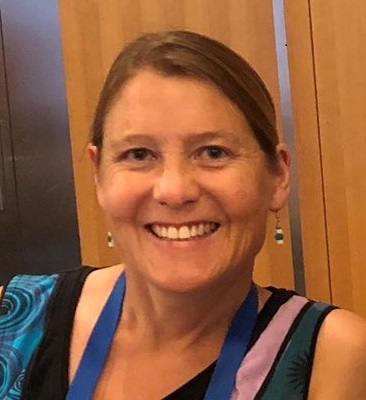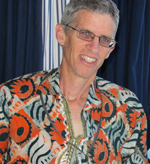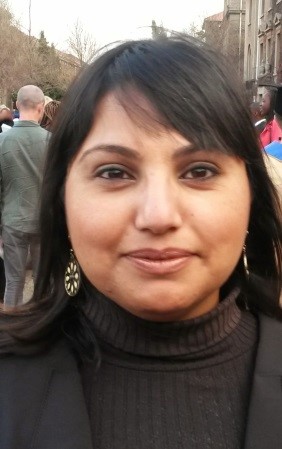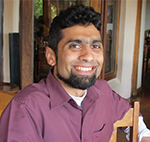Welcome to the Division of Public Health Medicine

The practice of Public Health Medicine focuses on the delivery of population-oriented services aimed at promoting the health of communities, teaching in public health across disciplines and research to advance population health.
The Division of Public Health Medicine (PHM) coordinates the School’s contributions to undergraduate teaching in the medical and rehabilitation sciences in the faculty as well as the M Med specialisation programme in Public Health Medicine, which trains doctors as specialists in Public Health Medicine.
In terms of services, we have staff who are jointly appointed in the Health Department (Public Health Medicine specialists, registrars and other staff) and who provide technical support to the Provincial Health Department through the Health Impact Assessment Directorate and its related health department structures.
The Division also supports a wide range of research aimed at advancing public health practice and public health capacity in the health system as well as having many collaborations with other research institutions, government and NGO services.
The Division is thus closely integrated into the service platform in the Western Cape through its postgraduate and undergraduate teaching, preparing students for the challenges of working in the South African health system, and through its teaching and its research.
Find more information about our staff, the courses we teach, the postgraduate students in our Division, our areas of research and service, upcoming events and links.
Becoming a Professional (BP) and Becoming a Health Professional (BHP) are foundation courses for students in the health professions and which aim to ground students in the appropriate ethical and professional approaches to practice.
Health in Context - MBChB Programme 4th Year Course
The Health in Context course is a 6-week course offered to University of Cape Town 4th year medical students to prepare future medical practitioners appropriately for working in our South African health system and to be responsive to the broader South African societal context. The course integrates public health, family medicine, palliative care, health promotion and child health. Using a combination of in class and in community sessions, the course introduces students to the practice of community-oriented primary care (COPC) through theoretical and experiential learning including a targeted intervention determined by the needs of a specific community. Applying the COPC approach, this course trains future doctors to: The COPC model links individual clinical care to the broader population-level determinants of health.
Medical Student Electives
The Division of Public Health Medicine is now offering medical students in their clinical years the opportunity to be exposed to an element of healthcare which is often only interacted with many years after graduating – that of Management in Medicine.
Students are offered either 2- or 4-week electives in Public Health Medicine, during which time they; interact with Medical and Nursing managers, Heads of Clinical Units and Heads of Departments, conduct Action Research studies on quality of care and process indicators, learn about Quality Improvement projects in multi-disciplinary teams and present their work at monthly business management meetings in the operating theatre complex and intensive care units at Groote Schuur Hospital. This allows students the invaluable experience of studying, analysing, and improving clinical process problems through research, process mapping, data analysis, presentation and eventually implementation of devised solutions.
Students also have opportunities to interact with Public Health Medicine Registrars and Consultants, to learn more about health systems, strategy, policy, data, analytics and advocacy work that they perform for the provincial government. In the past year, five students have completed electives which have focused on the WHO Surgical Safety Checklist, Theatre Start Times, Surgical Site Infections and other Healthcare Association Infection reduction projects. Reviews from students have so far been positive, and further electives focusing on similar quality of care and sustainability in healthcare indicators are planned.
Although the content of the elective focuses on quality improvement and healthcare management methodology, the overall aim of the elective is to demonstrate career options in Public Health for medical doctors, and the relevance and importance of concepts taught in public health medicine to work performed both in the clinical and health systems spaces.
Further enquiries can be directed to: Shrikant.Peters@WesternCape.Gov.Za
The Master of Medicine in Public Health Medicine (MMed PHM) Programme is a specialist training programme over 4 years, in which registrars are placed with different health authorities to acquire practical skills in the field, and help to implement, manage, monitor, evaluate and improve the quality of different health services, systems and programmes. Since 2000, more than 30 graduates in Public Health Medicine have completed the programme. These graduates now work in government (35%), NGOs (23%), Universities (15%), in the private sector (12%) and as researchers (8%).
The Division has three specialists, six registrars and one specialist scientist on the establishment of the Health Impact Assessment (HIA) Directorate of the Health Department of the Western Cape Government (WCG) Health Department in joint posts with the University. The Health Impact Assessment Directorate includes four sub-directorates (Epidemiology & Disease Surveillance, Programme Impact Evaluation, Quality Assurance and Health Research) involved in key Public Health functions to which joint staff are attached and where they provide technical support. Their work involved the full gamut of public health support within the Health Department, not only within the HIA Directorate but also to other Chief Directorates and Unit (such as Specialised Services, the Rural and Cape Metro Districts, sub-districts and hospitals) and to other key public health functions in the province. For example, joint staff provide support in the form of:
- Health intelligence to support responses to COVID-19
- Assisting in the implementation, analysis and write up of surveillance (e.g. mortality surveillance, PMTCT, diarrhoeal surveillance, vaccine coverage, etc);
- Technical support for District Health Expenditure Reviews;
- Evaluations of provincial health programmes;
- Design, implementation and evaluation of programmes aimed at improving quality of health care;
- Development of patient records to improve capture of key clinical and health utilisation data;
- Database harmonization to improve public health intelligence;
- Demographic modeling to improve health planning;
The Western Cape Burden of Disease Rapid Review was launched by the MEC for Health recently. Several staff in the School were involved in writing the report.
The Public Health Medicine Division provides technical support to the public health functions in the Department of Health with a view to strengthening the delivery of high-quality, equitable and effective services, and promoting conditions, policies and behaviours for healthy living. Our brief is to build capacity amongst health professionals at under- and postgraduate levels, and in services in population-oriented skills so as to strengthen the public health intelligence available at all levels of the health system, including government, private sector and NGO sectors.
The area of Public Health Medicine practice is broad and the disciplines in public health embrace the measurement, behavioural, management and social sciences. Research in the division embraces studies in communicable and non-communicable disease, behaviour change, health promotion and disease prevention, community based services, health service improvements, human resource planning and management, programme evaluation, surveillance, quality, upstream determinants of health and research translation. Staff are involved in operations research projects in the areas of tuberculosis, HIV/AIDS, immunization and STI's, analyses of HIV cohorts, demographic health analysis, studies of migration trends and impacts on health services, mortality analysis and surveillance, public health orientated reproductive health research, human rights and public health, public health ethics, farm worker health, prevention of alcohol related harms and the health hazards of pesticides, research into health sciences education, and research into health sciences education. A recent focus has been work on data harmonization and curatorship of patient level data for public health planning, as well as investigating the process of research translation.
Managing Conflict of Interest in Health Research in Africa: Research is key to promoting and improving health and preventing disease. Resource-poor areas, such as in parts of sub-Saharan Africa, benefit from collaborative research partnerships between clinicians/researchers and industry. But the scientific rigour and research integrity of such collaborations need to be preserved, and the research partnerships need to be protected from threats such as conflicts of interest. Science Councils, and Research Ethics Committees (RECs) play key roles in sustaining science and health research, and are eminently positioned to identify, prevent or manage conflicts of interest. Yet, in sub-Saharan Africa, evidence indicates a need for such institutions to increase their capacity to manage conflicts of interest. UCT, in partnership with researchers in Kenya, Cameroon, Lebanon and elsewhere in South Africa, is steering a project to develop materials in the form of a toolkit and online course that will assist organisations in identifying and addressing conflicts of interest.
Table: Institutional guidelines from selected Research Ethics Committees and Science Granting Councils in Sub-Saharan African countries: Identifying and managing common conflicts of interest in health research. This Table summarises guidelines, from selected Research Ethics Committees and Science Granting Councils in SSA, to address conflicts of interest in health research.
Collaboration for Harm Reduction and Alcohol Safety in the Environment in Southern Africa (CHASE-SA) Project

Project Overview
The CHASE-SA project is a five-year international donor-funded initiative which commenced on 1 January 2025 and will conclude on 31 December 2029. The project aims to understand the full range of influences on alcohol use within South Africa (SA) to reduce harm from alcohol, with a focus on two provinces (Western Cape and Gauteng). Additional formative work will be undertaken in Botswana to facilitate capacity building and inform future alcohol policy research. See the Project Brochure for a synopsis.
Implementing Partners
CHASE-SA is led by the University of Cape Town in collaboration with:
- the South African Medical Research Council (SAMRC)
- the Centre for the AIDS Programme of Research in South Africa (CAPRISA)
- the University of Botswana (UB) and
- the London School of Hygiene & Tropical Medicine (LSTHM)
Study Sites
The project will be implemented across nine sites:
- Western Cape, SA: Khayelitsha, Klipfontein, and Riebeek West/Riebeek Kasteel
- Gauteng, SA: Olievenhoutbosch, Atteridgeville, and Ga-Rankuwa
- Botswana: Gaborone, Tlokweng, and Francistown
Research Focus
CHASE-SA is structured into four work packages (WP), addressing key research questions:
WP1: Political economy of the alcohol environment
What characterises the political, economic, and regulatory context of harmful alcohol use in SA and Botswana, including strategies by industry to further their interests?
WP2: Alcohol acquisition and consumption environments in SA and Botswana
What community-level and cultural factors influence alcohol acquisition/consumption?
WP3: Impacts of political, acquisition, and consumption environment changes
How do drivers shape drinking patterns/behaviours, health outcomes, and the alcohol economy?
WP4: From evidence to action and advocacy: co-creation through mutual learning
How can we harness community and policymaker voices to advocate for reduced alcohol harm and influence policy/interventions?
Ethics approval
Ethics approval was granted by the UCT Human Research Ethics Committee on 25 May 2025 (HREC Ref 300/2025) for parts of WP1, WP2 and part of WP3. View Research Summary
Logic Framework
The CHASE-SA’s logic framework for the research project is based on Walls et al (2020) - Advancing alcohol research in low-income and middle-income countries: a global alcohol environment framework.

Research Timeline

Contractors
GeoSpace International PTY (LTD) is contracted to conduct fieldwork in both SA and Botswana during 2025 – 2026.
South African Alcohol Policy Alliance is contracted to facilitate the community engagement and involvement work in South Africa for the entire duration of the project.
Fieldwork
GeoSpace International (Pty) LTD will conduct fieldwork across all sites.
- Western Cape: Starts 8 Sept 2025
- Gauteng: Starts 15 September 2025
- Botswana: Begins early 2026
Fieldwork details for the six SA sites, including the data that will be collected, selected sites where data collection will take place, the identification of fieldworkers and the teams for both Western Cape and Gauteng, are detailed in this document.
Contact Us
For more information:
📞 021 650 4909
The Division has strong links with other programmes training registrars in Public Health Medicine in South Africa as well as supporting the Public Health Association of South Africa. It is actively engaged in facilitating the contribution of Public Health Medicine to the important policy re-engineering initiatives aimed at improving universal access to health care and addressing the burden of disease in South Africa.
Mary-Ann Davies, Professor and Acting Head of Division 
Email: Mary-Ann.Davies@uct.ac.za Phone: 021 406 6051 Mary-Ann Davies is a Public Health Medicine Specialist and Paediatric Clinical Epidemiologist at the University of Cape Town. She convenes the MPH module on Infectious Disease Epidemiology. She is joint Principal Investigator of IeDEA Southern Africa, together with Matthias Egger from the University of Bern in Switzerland. Here major research interests are paediatric HIV treatment and prevention, especially HIV cohort research to address key policy and implementation questions. |
Andrew Boulle, Professor 
Email: Andrew.Boulle@uct.ac.za Phone: 021 406 6715 Andrew Boulle is a Public Health Medicine specialist with the Western Cape Provincial Department of Health and Professor of Public Health Medicine at the University of Cape Town. His research has predominantly addressed operational and clinical questions related to HIV service provision, often through analyses of HIV cohorts or population-based analyses. A further focus is context-appropriate information systems development in health care and the use and harmonisation of person-level health data for service and patient benefit. He currently provides oversight for the Provincial Health Data Centre in the Provincial Department of Health and leads the African Health Information Exchange consortium which brings together organisations working on interoperability and technical solutions in support of services for HIV and tuberculosis. Centre for Integrated Data and Epidemiological Research (CIDER) Public Health Medicine specialist training |
Nisha Jacob, Associate Professor 
Associate Professor Nisha Jacob is a Public Health Physician jointly appointed at the School of Public Health, University of Cape Town (UCT) and Western Cape Department of Health and Wellness. She attained her medical degree (MBChB) from UCT in 2008. She has worked in the Eastern Cape and Western Cape provinces of South Africa in clinical, managerial and research settings. In 2016, she obtained her Fellowship in Public Health Medicine from the Colleges of Medicine South Africa and was also awarded the Henry Gluckman Award. She obtained her Masters in Medicine (Public Health Medicine) with distinction from UCT and in 2025, was awarded her PhD in Public Health Medicine. She has served as convenor of the 4th year MBChB Health in Context course, chair of the Undergraduate Committee for the School of Public Health and member of the Global Surgery Steering Committee. She currently serves on the Boards of UCT Faculty of Health Sciences, St Joseph’s Intermediate Paediatric Care Facility, Equal Health for Deaf People and Child Safe, and is an editorial board member for PLOS Global Health. Her research interests include HIV, health information system strengthening, infectious diseases and child health. She is also actively involved in undergraduate and postgraduate public health education and mentorship and has served as examiner for the Colleges of Public Health Medicine (SA) Fellowship exams over the past few years. Her published research can be viewed here |
Tracey Naledi, Associate Professor 
Tracey Naledi is an Associate Professor of Public Health Medicine and the Deputy Dean: Social Accountability and Health Systems at the Faculty of Health Sciences, University of Cape Town. Tracey has held technical & management positions in Government and NGO sectors in South Africa and Botswana. Her work includes the translation of research into policy and practice, addressing health inequity and strengthening systems for health. Tracey is the Founding Chairperson of Tekano, Atlantic Fellows for Health Equity in South Africa, Chairperson of SHAWCO and the Children’s Institute, a Board Member of the Global Brain Health Institute and the South African Medical Research Council. Tracey is a Discovery Foundation Fellow and the Desmond and Leah Tutu Legacy Foundation Fellow. |
James Irlam, Senior Lecturer 
Email: James.Irlam@uct.ac.za Phone: 021 406 6377 Teaching & Research Fields |
Ntsiki Mapukata, Senior Lecturer 
Email: Ntsiki.Mapukata@uct.ac.za Phone: 021 406 6710 Ntsiki qualified as a cytotechnologist in 1989 and worked in the State Pathology Laboratory in Umtata until February 1998. Since then, she has been working in higher education institutions at DUT (December 2004); Wits Division of Rural Health (December 2016); Wits: Office of Student Support (March 2019). As a convenor of the Becoming a Health Professional course, she hopes to continue to explore her broader research interests on health sciences students’ engagement with the education system. Ntsiki obtained a PhD in Public Health from Wits University. Her study explored the influence of habitus on professionalization of health sciences students of rural origin. Ntsiki is a co-investigator on a Wits-based project that seeks to understand the transition, university experiences and success factors of students from less privileged communities. |
Swabhavika Singh, Senior Lecturer 
Dr Swabhavika Singh is a Public Health Medicine Specialist. She holds a Bachelor of Medical Sciences, Bachelor of Medicine and Surgery, Masters of Medicine in Public Health and a Masters of Science in Bioethics and Health Law. She served an internship at the World Health Organisation in Geneva within the Family, Women, Adolescent and Child Health cluster in 2019. She has clinical experience at primary, district, regional and quaternary levels of care. She previously worked as a specialist lecture at the University of KwaZulu-Natal coordinating and teaching on the undergraduate MBCHB program and the postgraduate Public Health programs. Her passion lies in health policy, bioethics, and health system strengthening. |
Siwe Toto, Senior Lecturer 
Email: Siwe.Toto@uct.ac.za Phone: 021 650 4485 Siwe Toto is an Occupational Therapist at the University of Cape Town, where he works as a senior lecturer in the School of Public Health. His main responsibility is convening a course called 'Becoming a Professional,' designed specifically for first-year health sciences students. Siwe's research interests revolve around the philosophy of -, discourse of-, and rhetoric of the occupational therapy profession and the discipline of occupational science, with a particular emphasis on perspectives from the global south. Additionally, he is devoted to exploring decoloniality within health sciences and primary health care. Apart from his professional pursuits, Siwe has a deep passion for outdoor activities like hiking, running, and walking, which he incorporates into his occupational therapy practice by offering therapeutic hikes to individuals (and students) in need. |
Feroza Amien, Lecturer 
Email: Feroza.Amien@uct.ac.za Phone: 021 406 6221 Feroza Amien is a Dental Public Health Specialist with a focus on inter-professional educational issues which includes incorporating necessary oral health curricula into the relevant health professions. Feroza also has a keen interest in medical education and Problem-based Learning (PBL) in particular. In 2010 she attended an advanced course in PBL at Maastricht University in the Netherlands. Whilst there, Feroza conducted a film project about PBL facilitator development in different countries. For more information on the latter, click here |
Ishaaq Datay, Lecturer, Joint FaCE/SPH 
Email: Ishaaq.Datay@uct.ac.za Phone: 021 650 2882 Teaching & Research Fields |
Senior Lecturer Part-time
| Kerrin Begg, Deputy Dean: Joint Faculty-Dept appointment |
Senior Research Officers
| Emma Kalk |
| Hanne Haricharan |
Medical Natural Scientist
Nesbert Zinyakatira 
Email: nesbert.zinyakatira@uct.ac.za Phone: 021 650 1664 Nesbert Zinyakatira is a Demographer/Epidemiologist with the Western Cape Department of Health and School of Public Health at the University of Cape Town. His areas of research include HIV associated TB, demographic health analysis, population projections, migration trends and impacts on health services, mortality analysis and surveillance, data harmonization and curatorship of patient level data as well as analysis of health data in the public health sector. He is also involved in undergraduate and postgraduate teaching in Demography and Biostatistics. |
Principal Research Officer, Post-retirement
Leslie London

Email: Leslie.London@uct.ac.za Leslie London is a public health specialist with an interest in human rights, public health ethics, farm worker health, prevention of alcohol related harms and the health hazards of pesticides. He leads the Health and Human Rights programme and conducts research and teaching across the Division of Public Health Medicine, the Division of Environmental Health and the Centre for Occupational and Environmental Health Research. He is currently an investigator on international collaborative research projects addressing community participation in plural health systems, population benefits from health research and Harm Reduction and Alcohol Safety in the Environment in Southern Africa. |
Emeritus Associate Professors
David Coetzee Email: David.Coetezee@uct.ac.za
|
Virginia Zweigenthal 
Email: Virginia.Zweigenthal@uct.ac.za
Virginia Zweigenthal is a public health medicine specialist with an interest in both undergraduate and postgraduate public health education that prepares practitioners for practice in complex work environments. She is interested in research translation - the impact of research on services and the involvement of service providers in research. Virginia has an interest in public health orientated reproductive health and HIV research. |
Honorary Adjunct Associate Professor
| Rosemary Foster |
Honorary Professors
Richard Matzopoulos 
Richard Matzopoulos is a Chief Specialist Scientist and Co-Director of the South African Medical Research Council’s Burden of Disease Research Unit and an Honorary Professor at the University of Cape Town’s Division of Public Health Medicine, where he co-ordinates its Violence and Injury Research programme. His research centres on measuring the health and social burden of violence and injury, and evaluating interventions and policies that target upstream determinants. He advises the Western Cape Government on alcohol harm reduction, and interpersonal violence and injury prevention and surveillance. He is a South African focal point for the international Violence Prevention Alliance and a Member of the International Collaborative Effort on Injury Statistics and Methods. |
Neo Morojele
|
Tolullah Oni 
Tolu Oni (ORCID ID) is a Public Health Physician Scientist and urban epidemiologist, joint lead of the University of Cambridge MRC Epidemiology Unit Global Diet and Activity Research programme, and Honorary Associate Professor in Public Health at the University of Cape Town. She leads the Research Initiative for Cities Health and Equity (RICHE|Africa), an urban health group focused on building intersectoral systems for health as well as prevention of infectious and non-communicable disease multimorbidity in the context of epidemiological transition. RICHE|Africa is thus a collaborative of transdisciplinary science, policy and societal actors, generating evidence to support development and implementation of healthy public policies in cities, and identifying creative strategies to address complex urban population health challenges in rapidly growing cities. Recent and ongoing projects led by A/Prof Oni include:
|
Hayley McGregor
|
Honorary Associate Professors
| Nadine Harker-Burnhams |
| Sizulu Moyo |
Honorary Senior Lecturers
| David Pienaar |
| Muzzammil Ismail |
Honorary Lecturers
| Glynis Denicker |
| Ziyanda Mgugudo-Sello |
| Erna Morden |
| Shrikant Peters |
Honorary Research Associates
| Theresa Boulle |
| Vera Coelho |
| Surekha Garimella |
| Moses Mulumba |
| Judith Mwansa |
| Chris Seebregts |
Registrars
| Laurene Booyens |
| Leanne Brady |
| Maria José |
| Lefa Kekana-Hlatswayo |
| Sheila Lubega |
| Melwin Moodley |
| Thato Mosidi |
| Gugu Ngubane |
| Nathina Pakade |
| Chriselda Pillay |
| Kaneez Sayed |
| Yamanya Tembo |
| Mpho Tlali |
| Marcia Vermeulen |
Administrative Staff
| Name | Description | Telephone No | |
|---|---|---|---|
| Nthabiseng Khumalo | Undergraduate Administrative Officer & Divisional Administrator | 021 406 6710 | |
| Dominique Adams | 4th Year Undergraduate Administrative Officer | 021 650 5789 | |
| Sharon Ferguson | Postgraduate Administrator: MMed Programme | 021 650 4765 |
Publications
Public Health Medicine
2019
- Oni T, Yudkin JS, Fonn S, Adongo P, Kaseje M, Ajuwon A, Doyal L, London L. Global public health starts at home: upstream approaches to global health training. Lancet 2019; 7: e301-302.
- Anaf JM, Baum FE, Fisher M, London L. The health impacts of extractive industry transnational corporations: a study of Rio Tinto in Australia and Southern Africa. Globalization and Health 2019; 15:13.
- Zwame G, Stuattaford MC, Haricharan HJ, London L. Rights-based Training Enhancing Engagement of Health Providers with Communities, Cape Metropole, South Africa. Frontiers in Sociology 2019; 4:35.
- Fontes Marx M, London L, Harker N, Ataguba JE. Equity in the household socioeconomic distribution of spending on alcoholic beverages in South Africa: Assessing changes between 1995 and 2011. International Journal for Equity in Health (in press, 2019).
2018
- Amanuel H, Morojele N, London L. The Health and Social Impacts of Easy Access to Alcohol and Exposure to Alcohol Advertisements among Women of Childbearing Age in Urban and Rural South Africa. Journal of Studies on Alcohol and Drugs 2018; 79(2): 302-308.
- Zweigenthal Z, Pick W, London L. Motivations of South African physicians specialising in public health. Global Health Action 2018; 11: 1475039.
- Gwyther L, Heap M, London L. Access to palliative care in HIV services in Cape Town. AIDS Care 2018; 30 (Suppl 2): 11-15. DOI: 10.1080/09540121.2018.1470307
- Bertscher A, London L, Orgill M. Unpacking policy formulation and industry influence: the case of the draft Control of Marketing of Alcoholic Beverages Bill in South Africa. Health Policy and Planning 2018; 33: 786–800.
- Douwes R, Stuttaford M, London L. Social solidarity, human rights and collective action: Considerations in the implementation of the National Health Insurance in South Africa. Health and Human Rights 2018; 20(2): 185-196.
- Fontes M, Müller A, London L. Missing knowledge of gendered power relations among non-governmental organisations doing right to health work: A Case Study from South Africa. BMC International Health and Human Rights 2018; 18: 33.
- Fontes M, Heap M, Gichane MW, London L. Validity and reliability of maternal recall of pregnancy history and service use among signing Deaf women: A cross-sectional descriptive study from South Africa. BMJ Open 2018;8:e023896.
- Mulumba M, London L, Nantaba J, Ngwena C. Promoting community participation as a social and underlying determinant on the right to health through Health Committees: Lessons from Uganda and South Africa. Health and Human Rights 2018; 20(2): 11-17.
2017
- Dheda K, Gumbo T, Maartens G, Dooley KE, McNerney R, Murray M, Furin J, Nardell EA, London L, Lessem E, Theron G, van Helden P, Niemann S, Merker M, Dowdy D, Van Rie A, Siu GKH, Pasipanodya JG, Rodrigues C, Clark TG, Sirgel FA, Esmail A, Lin H, Atre SR, Schaaf HS, Chang KC, Lange C, Nahid P, Udwadia ZF, Horsburgh CR, Churchyard GJ, Menzies D, Hesseling AC, Nuermberger E, McIlleron H, Fennelly KP, Goemaere E, Jaramillo E, Low M, Jara CM, Padayatchi N, Warren RM. The epidemiology, pathogenesis, transmission, diagnosis, and management of multidrug-resistant, extensively drug resistant, and incurable tuberculosis. Lancet Respiratory Medicine 2017; 7-76. (or Volume 5 , Issue 4 , 291 – 360).
- Gichane W, Heap M, Fontes M, London, L. “They must understand we are people”: Pregnancy and maternity service use among signing Deaf women in Cape Town. Disabil Health J. 2017 Apr 6. pii: S1936-6574(17)30066-3. [Epub ahead of print].
- Mabunda S, London L, Pienaar D. An Evaluation of the Role of an Intermediate Care Facility in the Continuum of Care in Western Cape, South Africa. International Journal of Health Policy and Management. 2017, 6(x), 1–13.
- Saban A, Morojele N, London L. A descriptive study of treatment provision for problem alcohol drinking in adult males in Khayelitsha, Cape Town, South Africa. BMC Health Services Research 2017, 17 (Suppl 2):740.
2016
- Muhwava LS, Morojele N, London L. Psychosocial factors associated with early initiation and frequency of antenatal care (ANC) visits in a rural and urban setting in South Africa: a cross-sectional survey. BMC Pregnancy and Childbirth. 2016; 16:18.
- London L, Cox H, Coomans F. Drug-Resistant TB: Implementing the Right to Health through the Right to Enjoy the Benefits of Scientific Progress. Health and Human Rights 2016; 18(1): 25-41.
- Baum FE, Sander DM, Fisher M, Anaf J, Freudenberg N, Friel S, Labonte R, London L, Monteiro C, Scott-Samuel A, Sen A. Assessing the health impact of transnational corporations: its importance and a framework. Globalization and Health (2016) 12:27.
- Zweigenthal VEM, Marquez E, London L. Why do an MPH? Motivations and intentions of doctors undertaking postgraduate public health training at the University of Cape Town. Global Health Action 2016; 9; 1654-9880 (Online).
- Rabbani F, Shipton L, White F, Nuwayhid I, London L, Ghaffar A, Thu Ha BT, Tomson G, Rimal R, Islam A, Takian A, Wong S, Zaidi S, Khan K, Karmaliani R, Abbas IN, Abbas F. Schools of public health in low and middle income countries: an imperative investment for improving the health of populations? BMC Public Health (2016) 16:941.
- One of multiple co-authors to: Social science approaches for research and engagement in health policy & systems (SHaPeS) thematic working group of Health Systems Global, Regional Network for Equity in Health in East and Southern Africa (EQUINET), and Emerging Voices for Global Health, Daniels K, Loewenson R, George A, Howard N, Koleva G, Lewin S, Marchal B, Nambiar D, Paina L, Sacks E, Sheikh K, Tetui M, Theobald S, Topp SM, Zwi AB. Fair publication of qualitative research in health systems: a call by health policy and systems researchers. Int J Equity Health. 2016 Jun 22;15(1):98.
2015
London L, Himonga C, Fick N, Stuttaford M. Social solidarity and the right to health: essential elements for people-centred health systems. Health Policy and Planning 2015; 30: 938–945.
2014
- Strecker M, Stutafford M, London L. Health rights pamphlets: critical literacy and inclusive citizenship, South Africa. Health Promotion International 2014; 29(2): 339-348.
- Saban A, Flisher A, Laubscher R, London L, Morojele N. The association between psychopathology and substance use: adolescent and young adult substance users in inpatient treatment in Cape Town, South Africa. Pan Afr Med J. 2014;17(Supp 1):8.
- Saban A, Flisher A, Grimsrud A, Morojele N, London L, Williams DR, Stein DJ. The association between substance use and common mental disorders in young adults: results from the South African Stress and Health (SASH) Survey. Pan Afr Med J. 2014;17(Supp 1):11.
- London L, Naledi T, Petros S. Health research in the Western Cape Province, South Africa: Lessons and challenges. Afr J Prm Health Care Fam Med. 2014; 6(1), Art. #698, 7 pages.
- Bowers Y, Rendall-Mkosi K, Davids A, Nel E, Jacobs N, London L. Liquor outlet density, deprivation and implications for foetal alcohol syndrome prevention in the Bergriver municipality in the Western Cape, South Africa. South African Geographical Journal 2014 96; 2: 153–165.
2013
- Haricharan HJH, Heap M, Coomans F, London L. Can we talk about the right to health care without language? A critique of key international human rights law, based on the consequences experienced by a Deaf woman in Cape Town, South Africa. Disability and Society 2013; 28(1): 54-66.
- Saban A, Flisher AJ, Laubscher R, Morojele NK, London L. Comorbid Psychopathology, Substance Use, and Treatment Outcomes: A Follow-Up of Inpatient Substance Users in Cape Town, South Africa. Journal of Groups in Addiction & Recovery. 2013; 8(3): 200-223.
- Rendall-Mkosi K, Morojele N, London L, Moodley S, Singh C, Girdler-Brown B. A randomised controlled trial of motivational interviewing to prevent risk for an alcohol exposed pregnancy in the Western Cape, South Africa. Addiction 2013; 108(4): 725-732.
- Haynes L, Legge D, London L, McCoy D, Sanders D, Schuftan C. Will the struggle for health equity and social justice be best served by a Framework Convention on Global Health? Health and Human Rights 2013; 15(1): 111-116.
- McLoughlin J, Little F, Mazok C, Parry C, London L. The prevalence of and associations with papsak wine consumption amongst farm workers in the Western Cape Province, South Africa. Journal of Studies on Alcohol and Drugs 2013; 74, 879–888.
- Naidu CS, Zweigenthal V, Irlam J, London L, Keikelame J. An evaluation of UCT medical students’ community placements in South Africa. African Journal of Primary Health Care & Family Medicine 2013; 4(1): 1-7.
- Peer N, Morojele N, London L. Factors associated with contraceptive use in a rural area in Western Cape Province. S Afr Med J 2013; 103(6):406-12.
2012
- Perez AM, Ahmed N, London L. Racial discrimination: experiences of black medical alumni at the University of Cape Town, 1945 – 1994. S Afr Med J 2012; 102: 574-577.
- Hoffman M, Coetzee D, Hodes R, London L. From Comprehensive Medicine to Public Health at the University of Cape Town -a 40 year journey. S Afr Med J 2012; 102; 442-445.
- London L, Schneider H. Globalisation and Health Inequalities: Can A Human Rights Paradigm Create Space For Civil Society Action? Social Science and Medicine 2012; 74: 6-13.
- Cox H, Escombe R, McDermid C, Mtshemla Y, Spelman T, Azevedo V, London L. Using wind-driven roof turbines to improve ventilation for TB infection control in primary care clinics in Khayelitsha, South Africa. PLoSOne 2012; 7(1): e29589.
- London L, Kagee A, Moodley K, Swartz L. Ethics, human rights and HIV vaccine trials in low income contexts. J Med Ethics 2012; 38: 286-293.
- London L, Fick N, Tram KH, Stuttaford M. Filling the gap: a learning network for health and human rights in the Western Cape, South Africa. Health and Human Rights 2012; 14/1: E88-E105.
- Meier MB, Pardue C, London L. Implementing community participation through legislative reform: a study of the policy framework for community participation in the Western Cape province of South Africa. BMC International Health and Human Rights 2012; 12(1):15.
- Stutafford M, Glattstein-Young G, London L. “Dialogue, review and reflect . . . you move forward but you also look back”: A Spiral of Co-learning and Co-research to Surface Knowledge on the Right to Health. Gateways: International Journal of Community Research and Engagement 2012; 5(1):115-134.
- Matzopoulos R, Parry CD, Corrigall J, Myers J, Goldstein S, London L. Global Fund collusion with liquor giant is a clear conflict of interest. Bull World Health Organ. 2012; 90(1): 67-9; discussion 70.
2011
- Katwan E, Adnams C, London L. Childhood behavioral and developmental disorders: association with maternal alcohol consumption in Cape Town, South Africa. S Afr Med J 2011; 101: 724-727.
- Mpinga EK, London L, Chastonay P. Health and human rights: epistemological status and perspectives of development. Med Health Care Philos. 2011; 14(3):237-47.
- Crede S, Sinanovic E, Adnams CA, London L. The Utilization of Health Care Services by Children with Foetal Alcohol Syndrome in the Western Cape, South Africa. Drug and Alcohol Dependence. 2011; 115: 175–182.
- Mwansa-Kambafilwe J, Rendall-Mkosi K, Jacobs R, Nel E, London L. Evaluation of a Service Provider Short Course for Prevention of Fetal Alcohol Syndrome. JSAD 2011; 72(4): 530-5.
- Mpinga EM, Verloo H, London L, Chastonay P. Health and Human Rights in scientific literature: A systematic review over a decade (1999-2008). Health and Human Rights 2011; 13(2): 1-27.
2010
- Morojele NK, LondonL, Olorunju SA, Matjila J, Davids AS, Rendall-Mkosi KM. Predictors of Risk of Alcohol-Exposed Pregnancies among Women in an Urban and a Rural Area of South Africa. SocSci Med 2010;70: 534-42.
- Ojo OA, Louwagie G, Morojele N, Rendall-Mkosi K, London L, Olorunju S, DavidsA. Factors associated with female high-risk drinking in a rural and an urban South African site. S Afr Med J. 2010 Mar 8;100(3):180-2.
Public Health Medicine
2019
- Shawa R, Coomans F, Cox H, London L. Access to effective treatment for Drug-Resistant Tuberculosis: Deepening the Human Rights-based Approach. In (Eds: Jamrozik E., Selgelid M.J) Ethics and Drug-Resistant Infections: Collective Responsibility for Global Public Health. Springer, Cham: 2019 (in press).
2018
- London L. (2018). The Rights to Enjoy the Benefits of Scientific Progress for small farmers facing pesticides hazards. In: (Eds F Zolzer, G Meskens) Environmental Health Risks: Ethical aspects. Routledge: Oxford, pp 65-80.
- London L. Health, human rights and ethics. In: Primary Health Care. Fresh Perspectives. Chapter 11, pp 265-307. Pearson/Prentice Hall, Pinelands, Cape Town, 2009; Updated for second edition as Chapter 12, in 2018
2016
- London L. (2016). Primary Care Research – how to put local priorities into a world led by global funding. In (Eds Goodyear-Smith F, Mash R). International Perspectives to Primary Care Research, pp103-107. CRC Press: Boca Raton.
- Zweigenthal V, London L, Pick W. The contribution of specialist training programmes to the development of a public health workforce in South Africa. In Padarath A, King J, Mackie E, Casciola J, editors. South African Health Review 2016. Durban: Health Systems Trust; 2016. pp 45-60.
2015
- Padarath A, Sanders D, London L, Boulle T, Haricharan H, King J. Community participation in the post-apartheid era: progress and challenges. In: Eds Fryatt RJ, Andrews G, Matsoso MP. South Africa health reforms 2009 – 2014: Moving towards universal coverage. Juta, Cape Town, 2015: 224-243.
- Levendal E, English R, Schneider H, London L, Haricharan H. Health governance. In: Eds Fryatt RJ, Andrews G, Matsoso MP. South Africa health reforms 2009 – 2014: Moving towards universal coverage. Juta, Cape Town, 2015: 244-280.
- London L, Macdonald H. (2015). Transnational excursions: The ethics of northern anthropological investigations going south. In (Eds Posel D, Ross F) Ethical Quandries in Social Research, pp 93-110. HSRC Press: Cape Town.
2014
- Stuttaford, M., Kiewiets, D., Nefdt, W., Reynolds, V., Rhodes, G., Sigasana, L. and London, L. (2014). Conceptualising Implementation of the Right to Health: the Learning Network for Health and Human Rights, Western Cape, South Africa. In M. Freeman, S. Hawkes and B. Bennett (Eds) Law and Global Health, Current Legal Issues, Volume 16, Oxford: Oxford University Press 2014, pp76-93.
2013
- London L, Rubenstein L, Baldwin-Ragaven L. (2013). The problem of Dual Loyalty in Public Health. In (Eds: Grodin M, Tarantola D, Annas G, Gruskin S, Mann J). Health and Human Rights in a Changing World. Pp 322-323. Routledge: New York.
2011
- London L. Human rights: the relevance for South African health professionals. In: Moodley K (Ed), Medical Ethics, Law and Human Rights. Van Schaik, Cape Town, 2011; updated second edition 2017.
2010
- London L, Rubenstein L, Baldwin-Ragaven L. The problem of Dual Loyalty and role conflict in Public Health. In: Beracochea E, Weinstein C, Evans D (Eds), Rights-Based Approaches to Public Health. Springer. Chapter 7, pp 119-141, New York, 2010.
- Meier BM, Gable L, Getgen JE, London L. Rights-Based Approaches to Public Health Systems.In: Beracochea E, Weinstein C, Evans D (Eds), Rights-Based Approaches to Public Health. Springer. Chapter 2, pp 19-30, New York, 2010.
Centre for Occupational and Environmental Health Research
2019
London L, Jørs E, Neupane D. Pesticide poisoning: A response to Eddleston. Environ Health Insights. 2019 Jan 27; 13: 1178630218825243.
2018
- Glass T, Dalvie MA, Holtman Z, Vorster AA, London L, Ramesar R. DNA variants and Organophosphate Neurotoxicity among Emerging farmers in the Western Cape of South Africa. American J Industrial Medicine 2018; 61(1); 11-20. Epub 2017 Nov 16.
- LaDou J, London L, Watterson A. Occupational health: a world of false promises. Environmental Health 2018; 17:81. URL:
- Jørs E, Neupane D, London L. Pesticide Poisonings in Low and Middle Income Countries. Environmental Health Insights 2018; 12:1178630217750876.
2017
- Lekei EE, Ngowi AV, London L. Knowledge and practices relating to acute pesticide poisoning among health care providers in selected regions of Tanzania. Environmental Health Insights. 2017 (1-11).
- Sathar, F, Dalvie MA, Rother HA, London L. Demographic determinants of chemical safety information recall in workers and consumers in South Africa: a cross sectional study. Journal of Safety Research 2017; 63C: 61-71.
- Lekei E, Ngowi AVF, London L. Acute Pesticide Poisoning in Children: Hospital Review in Selected Hospitals of Tanzania. Journal of Toxicology; 2017: Article ID 4208405, 8 pages, 2017.
2016
- London L, Kisting S. The Extractive Industries: Can We Find New Solutions to Seemingly Intractable Problems? New Solut 2016; 25:421-430.
- Willems M, Dalvie MA, London L, Rother HA. Health Risk Perception Related to Fracking in the Karoo, South Africa. Environmental Practice 2016; 18: 1-16.
- Lekei EE, Ngowi AV, London L. Under-reporting of acute pesticide poisoning in Tanzania: modelling results from two cross-sectional studies. Environ Health. 2016 Nov 29; 15 (1):118.
2015
Burnhams NH, London L, Laubscher R, Nel E, Parry C. Results of a cluster randomised controlled trial to reduce risky use of alcohol, alcohol-related HIV risks and improve help-seeking behaviour among safety and security employees in the Western Cape, South Africa. Subst Abuse Treat Prev Policy. 2015 May 8;10(1):18.
2014
- Lucchini RG, London L. Global Occupational Health: Current Challenges and the Need for Urgent Action. Annals of Global Health 2014; 80: 251-256.
- Dalvie MA, Sosan B, Cairncross E, London L. Environmental monitoring of pesticide residues from farms at a neighbouring primary and pre-school in the Western Cape in South Africa. Science of the Total Environment 2014; 466-467C:1078-1084.
- Lekei EE, Ngowi AV, London L. Farmers' knowledge, practices and injuries associated with pesticide exposure in rural farming villages in Tanzania. BMC Public Health 2014; 14:389.
- Harker-Burnhams N, Parry C, Laubscher R, London L. Prevalence and predictors of problematic alcohol use, risky sexual practices and other negative consequences associated with alcohol use among safety and security employees in the Western Cape, South Africa. Substance Abuse Treatment, Prevention, and Policy2014, 9:14.
- London L, Tangwa G, Matchaba-Hove R, Mkhize N, Nwabueze R, Nyika A, Westerholm P. Ethics in occupational health: deliberations of an international workgroup addressing challenges in an African context. BMC Medical Ethics.2014, 15:48.
- Dalvie MA, Rother HA, London L. Chemical Hazard Communication Comprehensibility in South Africa: Safety Implications for the adoption of the Globally Harmonized System of Classification and Labeling of Chemicals. Safety Science 2014; 61: 51–58.
- Lekei E, Ngowi AV, London L. Hospital-based surveillance for acute pesticide poisoning caused by neurotoxic and other pesticides in Tanzania. Neurotoxicology 2014; 45: 318–326.
- Myers JE, London L, Lucchini R. Neurotoxicology and Development: Human, Environmental and Social Impacts. Neurotoxicology 2014; 45: 217-219.
- Lekei EE, Ngowi AV, London L. Pesticide retailers' knowledge and handling practices in selected towns of Tanzania. Environ Health 2014; 13: 79.
- Norman ID, London L, Aikins MS, Binka FN. The Delaying of Workmen’s Compensation in Ghana. Occupational Medicine & Health Affairs, 2014; 2(2): 1-8.
2013
Harker-Burnhams N, Musekiwa A, Parry C, London L. Do workplace substance abuse prevention programmes include a focus on substance-related HIV risk behaviors: A systematic review. African Journal of Drug and Alcohol Studies 2013; 12(1): 1-22.
2012
London L, Beseler C, Bouchard MF, Bellinger DC,Colosio C, Grandjean P, Harari R, Kootbodien T, Kromhout H, Little F, Meijster T, Moretto A, Rohlman DS,Stallones L. Neurobehavioural and neurodevelopmental effects of pesticide exposures. Neurotoxicology 2012; 33: 887–896.
2011
- London L. Human Rights and Health: Opportunities to Advance Rural Occupational Health. International Journal of Occupational and Environmental Health 2011;17:80–92.
- Dalvie MA, Naik I, Channa K, London L. Urinary dialkyl phosphate levels before and after first season chlorpyrifos spraying amongst farm workers in the Western Cape, South Africa. Journal of Environmental Science and Health, Part B2011; 46: 163-72.
- Naidoo S, London L, Burdorf A, Naidoo RN, Kromhout H. Spontaneous miscarriages and infant deaths among female farmers in rural South Africa. Scand J Work Envir Health.2011;37(3):227–236.
- Ewert EG, Baldwin-Ragaven L, London L. Training Trainers in Health and Human Rights: Implementing curriculum change in South African health sciences institutions. BMC Medical Education 2011, 11:47.
- London L, Manjra S. Employability and HIV infection: Can the military claim to be an exception? Int J OccEnvir Health 2011; 17: 352–360.
- Naidoo S, London L, Budorf A, Naidoo R, Kromhout H. Occupational activities and a reported history of Malaria among women working in small-scale agriculture in South Africa. American Journal of Tropical Medicine and Hygiene 2011; 85:805-810.
- Holtman Z, London L, Flisher A. Suicide in a poor rural community in the Western Cape, South Africa: experiences of five suicide attempters and their families. South African Journal of Psychology, Volume 41(3), September 2011; 41(3): 300-309.
2010
- London L, Coggon D, Moretto A, Westerholm P, Wilks MF, Colosio C. The ethics of human volunteer studies involving experimental exposure to pesticides: unanswered dilemmas. Environmental Health 2010; 9: 50.
- Wesseling C, van Wendel de Joode B, Keifer M, London L, Mergler D, Stallones L. Symptoms of psychological distress and suicidal ideation among banana workers with a history of poisoning by organophosphate or n-methyl carbamate pesticides.Occup Environ Med 2010; 67: 778-84.
- Balme K, Roberts C, Glasstone M, Curling L, Rother A, London L, Zar H, Mann M. Pesticide poisonings at a tertiary children's hospital in South Africa: an increasing problem. Clinical Toxicology 2010; 48, 928–934.
- Naidoo S, London L, Rother H-A, Burdorf A, Naidoo RN, Kromhout H. Pesticide safety training and practices in women working in small-scale agriculture in South Africa. OccEnv Med 2010;67:823-8.
Centre for Occupational and Environmental Health Research
2016
- London L, Willems M. Hydraulic Fracturing in Shale Gas Extraction: Public Health Challenges for South Africa. In: (Eds Glazewski J, Esterhuyse S.) Proposed Hydraulic Fracturing in the Karoo: Critical Legal And Environmental Perspectives. Pp 323-344. Cape Town: Juta and Co 2016.
- Genthe, B., Maherry, A., Steyn, M., Rother, A., London, L., and Willems, M. 2016. Impacts on Human Health. In: Scholes, R., Lochner, P., Schreiner, G., Snyman-Van der Walt, L. and de Jager, M. (eds.). 2016. Shale Gas Development in the Central Karoo: A Scientific Assessment of the Opportunities and Risks. CSIR/IU/021MH/EXP/2016/003/A, ISBN 978-0-7988-5631-7, Pretoria: CSIR. Available at http://seasgd.csir.co.za/scientific-assessment-chapters.
- London L. Worker Health and Safety, International Issues. pp 617-625, in Heggenhougen and Quah: International Encyclopedia of Public Health (2008), Volume 6, Academic Press, San Diego; updated in 2016 as London, L., Kisting, S., 2017. Worker Health and Safety: International Issues. In: Quah, S.R. and Cockerham, W.C. (eds.) The International Encyclopedia of Public Health, 2nd edition. vol. 7, pp. 444–452. Oxford: Academic Press.
2011
London L, Joshi TK, Cairncross E and Claudio L. (2011). Environmental Justice: an international perspective. In: Nriagu JO (ed.) Encyclopedia of Environmental Health, volume 2, pp. 441–448 Burlington: Elsevier. Updated 2018 as London L, Joshi TK, Cairncross E, Gilmore J, Claudio L (2018; in press) Environmental Justice: an international perspective. In: Nriagu JO (ed.) Encyclopedia of Environmental Health, Burlington: Elsevier.
